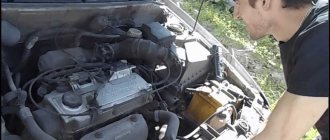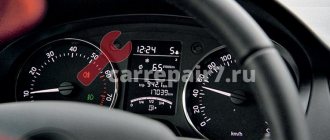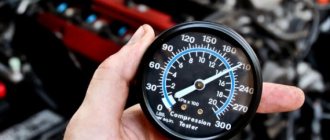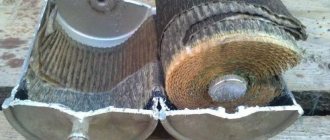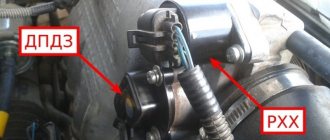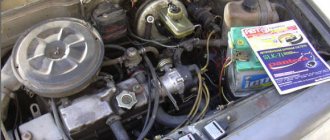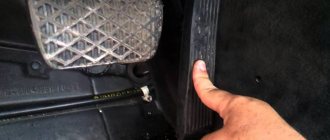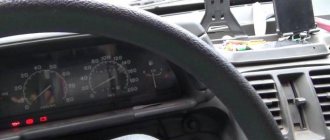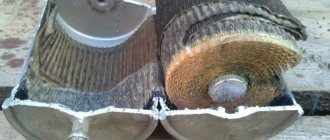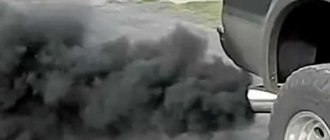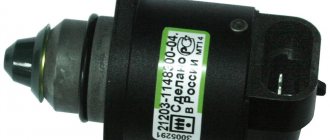Almost all motorists who have had quite a long driving experience have at least once encountered a situation where, when they press the gas pedal, the car simply stalls. There are several reasons why a vehicle behaves this way. These could be problems with ignition or fuel supply, failures in electronics and in the exhaust manifold. The only thing that can be taken as consolation is that identifying the causes is usually not very difficult. You just need to carefully analyze not only the fact that the engine is stalling, but the accompanying signs of failure. Let's look at the main reasons for the breakdown together.
Can weather affect engine performance?
If the engine stalls when you press the gas pedal, then pay attention to the weather. If this situation occurs in humid air or rain, then a lot of moisture may have accumulated on the distributor. When there is high humidity or rain, water gets on the ignition distributors. This happens because when the car sits for a long time, a damp environment forms inside the distributor cap.
Often the shape of the distribution cap allows the vehicle to misfire. As a result of this misfire, electricity stops flowing to the spark plugs. At idle speed this problem may not occur. This situation occurs mainly when you press the gas pedal.
The fact is that if you press the pedal, the distributor starts working much faster. Much more current begins to flow through it. If the environment is humid, then the likelihood of misfire becomes greater. As a result, the engine does not receive the required amount of “spark” and stalls.
It is not difficult to confirm the presence of just such a reason for the car’s failure. To do this, you need to pay attention to whether this problem occurs when the engine is warm and the weather is dry.
If the weather is still damp and you need to check the machine’s functionality, you can simply put the car in the garage for a certain period of time.
Idle speed control
Statistics show that a breakdown of the idle speed controller, which is responsible for the appropriate engine speed, is the most common cause of engine shutdown.
Of course, such a breakdown is only suitable for an injection engine. How to be
: Check the correct operation of the idle speed control by cranking the crankshaft with the starter and simultaneously pressing the accelerator pedal. If the engine starts, but the speed increases, the IAC is broken. The problem is solved by replacing the spare part.
Note
: on VAZ MAC cars it changes in a couple of minutes.
Vacuum leak as a possible cause of engine stalling
If, when you press the gas pedal, the car refuses to move regardless of weather conditions, then the problem may be more serious. The car's fuel system has probably failed. There is often a vacuum leak. With this problem, the engine starts to stall occasionally, then the problem becomes more frequent.
Vacuum leakage negatively affects the state of the air-gas mixture. Therefore, the engine stalls when a person presses the pedal.
A vacuum leak can also be identified by looking at the Check Engine Light. However, such diagnostics can only be carried out by a highly qualified specialist. It is necessary to take the car to a service center, asking them to check the vehicle for leaks.
Intake air heating coil
For the fuel mixture to ignite, it must be at a certain temperature. And in order for the mixture to reach the desired temperature, Cummins ISF 2.8 engines have an element called an intake air heating spiral (candle).
This engine element starts working at low temperatures. It is located in the engine intake manifold and starts working after turning the ignition key. In principle, in the summer, when it’s warm outside, you can do without this detail. But on frosty days, starting the engine with the intake air heater not working will be very problematic.
Therefore, in the cold season, the first thing you need to do is check whether the intake air heating coil is working. This is easy to do - when the spiral is running, the intake manifold should be warm.
It is necessary to inspect the contacts of the spiral and the wires going to them. It often happens that the wires simply break. But sometimes it happens that the spiral itself fails. In this case, only replacing it will help.
The engine stalls regularly - the throttle position sensor is broken
Regular stopping of the car engine may indicate that the problem is a malfunction of the throttle sensor. This sensor measures the force when you press the gas. The data goes to the ECU (electronic control unit) of the propulsion system. The volume of fuel that should be injected into the combustion chamber of the engine is calculated.
This operation is carried out unnoticed by the driver, in a split second.
If the damper sensor provides erroneous information, injection of the required amount of fuel may not occur. This moment can often be observed when the driver presses the gas pedal. Only a mechanic can perform a quality check of the functioning of the sensor. This requires special knowledge.
As an additional signal, you can pay attention to the “Check Engine” indicator. If it lights up, then it can be assumed that there is a breakdown of the throttle sensor.
Cars with carburetor engines (VAZ 2101,2102,2103,2104,2105,2106,2107)
The reasons for this malfunction can be very diverse, but the 2 main ones are a malfunction of the fuel system and the ignition system. The search must be carried out step by step, then the desired result will be obtained. The reason for unstable engine operation is the over-enrichment or depletion of the fuel mixture entering the engine cylinders when the gas pedal is pressed. This should be taken into account when diagnosing faults.
Indirect signs by which you can determine the causes of unstable engine operation when you press the gas pedal.
1. When starting from a stop or idling, a “failure” is felt when you smoothly press the gas pedal. During acceleration and further movement, the engine runs stably.
2. While driving at low and medium speeds, when you press the gas pedal, the car jerks with a possible engine stop. This defect disappears when you press the gas pedal harder.
- Clogged channels, fuel nozzle, emulsion well with emulsion tube of the main metering system of the first chamber of the carburetor. It can be eliminated by cleaning and purging the channels and nozzle.
3. The engine stalls or there is a “failure” when you sharply press the gas pedal at idle, when starting from a stop, accelerating and moving the car at different speeds.
- The accelerator pump is faulty. Eliminated by disassembly, inspection and replacement of damaged parts from repair. set.
- Insufficient gasoline level in the carburetor float chamber. Eliminated by adjusting the position of the float.
If the fuel level in the carburetor float chamber is excessive, the mixture is greatly over-rich and entering the engine cylinders can “flood” the spark plugs. If the level is insufficient, the fuel mixture, on the contrary, is lean and when pressing the gas pedal, the engine does not receive the required amount of fuel and the car slows down instead of accelerating.
4. The engine stalls or a “failure” is felt when you sharply press the gas pedal. This malfunction occurs when the carburetor accelerator pump is faulty. First, you need to check the fuel supply to the sprayer by pressing the throttle valve drive lever (in this case, a portion of fuel should flow from the sprayer spout into the diffuser).
If after the above carburetor checks the malfunction is not eliminated, then you need to look for the cause in the ignition system.
First of all, you need to remove the spark plugs and check their condition. On a working spark plug, the skirt will be light brown in color, and soot and deposits will be minimal. If the spark plug is smoked (black soot is present), this indicates that the engine is running on a rich fuel mixture. If the color of the spark plug is white with signs of overheating, then this indicates that the engine is running on a lean mixture. A wet spark plug indicates that fuel does not ignite in that cylinder.
A defective spark plug can be identified without removing it from the engine. To do this, with the engine running, you need to disconnect the high-voltage wires from the spark plugs one by one (while observing safety rules using dielectric gloves or electrical insulating material). If the engine stalls when the wire is disconnected, then the spark plug is working; if the operation remains virtually unchanged, the spark plug is faulty.
We check the condition of high-voltage wires. The insulation resistance of the current-carrying wire, measured with a multimeter, should be no more than 10 kOhm.
Check the condition of the ignition distributor cap. The inner surface of the cover must be clean, the contacts must be free of signs of corrosion and scorching.
Ignition problem
If the car has ignition problems, the spark is very weak. If you press the gas sharply, the spark plugs are filled. The spark plugs are lit and the spark fades.
It is not difficult to test this hypothesis. When unscrewing the spark plug, it will become noticeable that it is wet. If there is a suspicion that there is a problem with the ignition, it is necessary to check the entire system.
Long-term service of spark plugs can lead to problems such as penetration into the housing.
Checking high voltage wires can be done using a spare kit. If it is missing, you can start the engine at night by looking under the hood. If the wires are damaged, current discharges may occur.
If a breakdown such as the car stalling when you press the gas is a frequent occurrence, then it is better to seek help from professionals.
Fuel quality
Don't forget that the quality of the fuel you fill can directly affect the quality of the fuel you fill. Some cars and engines are not allowed to use certain types of fuel at all. Therefore, we monitor and remember what we pour into the tank.
How to be
: Empty the gas tank and replace the fuel filter if the vehicle has already started to stall due to fuel. After this, try to fill only the necessary fuel of the appropriate quality level.
Power system failure
The car brakes when you press the gas pedal due to improper operation of the power system. This problem can arise for a variety of reasons. It often occurs due to the use of low-quality fuel. The fact is that low-quality gasoline contains mechanical impurities that lead to clogging of the power system (filter, injectors).
If the blockage is not severe, then dips when pressing the gas pedal appear occasionally. If the blockage is severe, fuel does not enter the combustion chamber at all. This leads to the fact that it becomes impossible to start the engine.
If such a problem occurs, then all fuel supply elements should be checked. First of all, it is necessary to assess the condition of the pump. It needs to be removed and checked.
If the pump is working in one direction along the fuel flow line, gasoline flows unhindered. When such a process is not observed, then we can safely say that there is a blockage. In this case, the pump housing is disassembled and the filter diaphragm is cleaned.
If the pump is in order, you will need to flush the injectors. Typically, this operation is carried out using ultrasound. This is done in a service center. In order to prevent this problem from occurring in the future, it is necessary to use only high-quality and proven fuel for the car.
Please note that lack of ventilation in the fuel tank may also cause the engine to stall. Ventilation is disrupted due to a clogged drain tube. If fuel is supplied abruptly from the tank to the engine, a vacuum develops. It's easy to check this problem. You must start the engine with the gas tank open. If the drain tube is dirty, the engine will start easily when the gas tank is open.
What to do
If a car suddenly begins to stall while in motion, then the first thing you need to do is diagnose various internal components, the failure of which can lead to similar consequences. And it’s better to start with the fuel system, since it is responsible for the correct operation of the engine.
Diagnostics is carried out in stages, starting with the parts that most often cause a malfunction and ending with those that are more difficult to repair:
Lack of gasoline in the tank, as practice shows, is the most common reason for engine shutdown. Sometimes this happens due to incorrect operation of the fuel level sensor. If, after turning off the ignition, a specific buzzing sound of the electric motor is heard, then it is highly likely that the car owner’s fuel mixture supply pump has failed. Lack of pressure leads to a lack of supply of the combustible mixture. For additional checking, connect a pressure gauge - the pressure with a properly functioning part is at least 2.7 atmospheres. Checking the cleanliness of the filter is one of the first diagnostic procedures. The filter element located inside the housing quickly becomes clogged with debris present in gasoline, even of high quality. To check its cleanliness, remove the connecting hose and turn the starter. If the filter is clogged, the required fuel stream does not appear. Fuel injection nozzles are another element susceptible to contamination. If a car enthusiast is forced to use low-quality gasoline or diesel fuel, they quickly become covered with dirt. For a diagnostic check, remove the ramp and turn the starter. No spraying means the problem lies here. Even motors like NDH 9 8 suffer from the problem.
If the inspection at the previous stages did not produce results, proceed to checking the operation of the ignition system. We are talking about gasoline units with spark plugs. Wires are a rather vulnerable element. For spark plugs to work correctly, there must be a gap between their electrodes and the surface itself must be clean.
More often than not, insulation suffers here and wears out quickly. To check the presence and strength of a spark, unscrew the spark plugs and place them on the valve cover. After this, rotate the crankshaft. If there is no clear spark on the electrodes of the spark plugs, the cause of the malfunction lies in them.
The most complex malfunction is associated with incorrect operation of the electronic control unit. If the camshaft position or crankshaft rotation sensors fail, the car will not be able to start because the unit will not allow the ignition system to operate.
The car occasionally stalls while driving
This happens with a large list of cars:
Most often it's the fuel pump. A clear sign, for example, in Renault, is error DF261. The pump or relay needs to be replaced.
The car starts on auto start and then immediately stalls.
Usually the problem occurs if the alarm is connected incorrectly. It is best to connect the latter to the tachometer, and not to other sensors, to avoid the problem.
The engine stalls while driving, then starts
For some cars, in particular the Nissan Almera H16 or X Trail, it is not such a rare situation when, when driving at full speed, the speed first floats and then drops. Usually the loss of power does not occur immediately, but the engine stalls, and after about a minute it starts again. The malfunction can be eliminated by cleaning the throttle or replacing the pump.
Electronics problems
Unstable engine operation may occur due to difficulties with the vehicle's electronic system. A large number of operations in the machine are performed under the control of the ECU. If the sensors malfunction, they send erroneous commands to the engine. In most cases, the throttle sensor is affected.
The error is the idle speed is not working properly. Normally, when you press the gas, the volume of fuel supplied should increase, but in reality, on the contrary, it only becomes smaller or stops completely. If you correctly adjust the sensor in a service center, you can solve this problem.
The coolant temperature sensor can also cause the car to brake when the gas pedal is pressed. If the sensor breaks, the engine stops working at high speeds. The ECU system is activated. In the absence of any signals from the sensor, the engine speed may drop to zero.
If the driver wants to increase the gas, the engine is turned off. The sensor must be checked. In most cases, repairing it is impossible; the sensor is replaced with a new device.
Troubleshooting and performing repairs when the car stalls while driving
This is the majority of problems you cannot solve on your own. You must contact a specialized service center. Especially do not waste time on repairs yourself when it comes to the on-board computer. Its firmware and diagnostics are only possible using special equipment.
When there is a need to change the idle speed sensor, just find its location, open the machine operating book and read in this section about replacing it. In reality > myth the process resembles unscrewing one nut and tightening another. The service will cost 500 rubles, but our client can do it at home quickly and free of charge. The following processes are also performed:
Wear of sealing gaskets
The design feature of the engine requires the presence of sealing gaskets. They make the engine structure more airtight. If the gaskets in the area of the manifold or cylinder block are worn out or have lost their tightness, then when you press the gas pedal, the engine may stall.
If the gasket burns out, coolant penetrates into the engine in the area of the cylinder block. In this situation, the engine continues to operate, but the number of revolutions decreases sharply. You may notice white smoke coming from the exhaust pipe.
The driver, faced with the problem of turning off the engine, finds himself in an extremely unpleasant situation. In order to eliminate this difficulty, you need to know the reason for its occurrence.
Carburetor adjustment
Carburetor adjustment consists of several stages:
- Adjust the float position as described above.
- Check and tighten the “quality” and “quantity” screws. Screw them in until they stop and unscrew 2-3 turns for a “quality” screw and 3-4 turns for a “quantitative” screw.”
- Connect a tachometer or auto tester to the “K” terminal of the ignition coil, and the second sensor to the body.
- Start and warm up the engine to 90°C
- Use a “quality” screw to set the maximum speed to the minimum. Gasoline consumption is increased by turning the screw counterclockwise.
- Use the "amount" screw to increase the speed by about 80-90 rpm.
- Using a high-quality screw, we determine whether these speeds are maximum; if not, we repeat the procedure.
- If the position of the adjusting screw does not affect the engine speed, tighten the quality control screw until the speed drops to 800-900 rpm.
This carburetor adjustment may not be entirely accurate, but does not require special equipment.
Exhaust manifold problem?
In order for the motor to work without breakdowns, it is extremely important that it is sealed. A high level of tightness is achieved through the use of gaskets. Very rarely the car starts to stall when you press the gas when depressurization occurs. In this situation, air enters the exhaust manifold.
Ultimately, this leads to the fact that the operation of preparing the fuel mixture fails. Excess air entering the fuel disrupts the entire work process. How to prevent this problem? It is necessary to seek help from professionals, since it is difficult to fix the breakdown on your own.
Burnout of the gasket in the cylinder area leads to cooling liquid beginning to penetrate into the engine. If the driver starts to press on the gas, the number of revolutions decreases sharply. In such a situation, it is necessary to change the gasket.
Thus, the engine may stall in different situations. There are many reasons for this problem. If they occur, it is important to carry out a timely diagnosis. Almost all problems can be fixed on your own. If the problem is serious, then it is advisable to contact professionals. It is unsafe to drive a disabled car.
>>>> Ideas for life | NOVATE.RU
5. Fuel filter It doesn’t matter what the driver owns - a VAZ or a foreign car. All cars, without exception, crash “just as well” due to problems with the fuel filter. Most often, such a disaster happened to really old models that had been in service for more than a year. The engine stalls due to interruptions in the fuel supply, which, in turn, begins due to a dirty filter.
How to be
: It is necessary to remove the fuel pump and replace the filter. Check the bank for blockages. If there is one, clean the fuel tank to avoid a quick recurrence of the problem.
